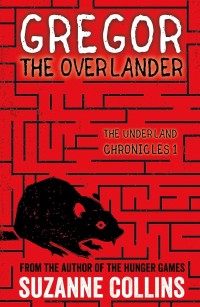
It’s heartbreaking. I’m tearing up by page 4. This series is advertised as a story for kids but it’s written in such a way that it’s just as interesting reading through it as an adult. A younger reader wouldn’t catch all the subtext (and there’s a lot of it).
As the oldest kid (11 years old) in his family, Gregor is tasked with taking care of his 2 year old baby sister over the summer while his single mother (Gregor’s father “disappeared” one night) works to put food on the table.
His grandmother lives with them and has Dementia (although Gregor doesn’t know that’s what it is).
For the last year his grandma had been slipping in and out of reality. One minute she was clear as a bell and the next she was calling him Simon. Who was Simon? He had no idea.
Gregor doesn’t speak like a child, in a lot of ways he’s a grown ass man in a boy’s body. Children don’t speak like this:
“Great, Day One and I’m looking forward to a trip to the laundry room,” Gregor thought. “By September, I’ll probably be ecstatic when we get the phone bill.”
This is fine because:
It makes it easier for me to step into Gregor’s shoes.
It makes him more interesting.
Trauma forces you to grow up quicker than normal.
Gregor is old at heart and he’s been through some shit. He’s depressed as hell because he misses his dad.
Gregor tried to remember the last time he’d felt as happy as Boots did with her ball. He had had some decent times over the past couple of years. […] But if he was honest with himself, Gregor knew it had been years since he’d felt real happiness.
THIS IS A BOOK FOR CHILDREN, PLEASE SEND HELP!
Not only has Gregor been through “some” shit, he’s about to go through “the” shit because each book involves Gregor going on a military/diplomatic mission in a world at war, or about to be at war.
Story spoilers for the end of the first book:
I know why this series is so important to me and blows me away whenever I read it. I experienced a lot of trauma as a kid, I’m not sure I’ve overcome that trauma by now but I know that it made me who I am today.
And so, I empathize with Gregor more than most people could. When he falls into a hole behind the washing machine and finds himself thrust into another world where fascists rats are committing humanitarian atrocities, I’m shaking in anticipation at the edge of my seat waiting for Gregor to figure things out, find the people he needs to find and find his way back home with the help of the friends he makes along the way.
This series is great. Is it perfect? No. I find it a little odd that the books contain prophecies (which are somewhat open to interpretation but seem to be more than just self-fulfilling) referring to the wars between the inhabitants of the Underland implying that these wars are inevitable.
This is at odds with the series’s anti-war message because in a world where war is inevitable, the people involved in it shouldn’t be held morally accountable for it. Right? If you’re fated/forced to do something then you shouldn’t be blamed for the consequences of your actions.
I don’t think Suzanne Collins is saying that wars in the real world are inevitable but these prophecies do weaken the series’s anti-war message while also providing a driving force to thrust Gregor into the thick of things and propel the story in interesting directions.
Overall though, this story is a story to end all stories. It’s so good. It’s Suzanne Collins’s best work and she wrote the Hunger Games (also pretty good) so that’s saying something.
This story has no right to be this good. And yet it is. And I thank (insert your preferred deity here) every day for its existence.